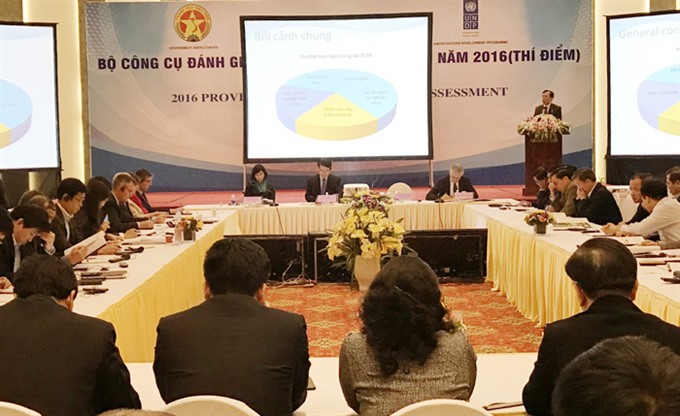 Society
Society

A new anti-corruption assessment indicates that the fight against corruption on the provincial level in Việt Nam has only met half of the Government’s expectations.
 |
| A new anti-corruption assessment indicates that the fight against corruption on the provincial level in Việt Nam has only met half of the Government’s expectations. — Photo dangcongsan.vn |
HÀ NỘI — A new anti-corruption assessment indicates that the fight against corruption on the provincial level in Việt Nam has only met half of the Government’s expectations.
According to the Provincial Anti-Corruption Assessment (PACA) issued on Thursday, the national average reached 58.11 points on a scale of 100.
"It indicates the distance still left to meet the objectives of anti-corruption set out by the Party and the Government," said the head of the Government Inspectorate’s (GI) Anti-Coruption Bureau, Phạm Trọng Đạt, at a workshop in Hà Nội.
PACA was a pilot anti-corruption index developed based on the methodology of South Korea’s Anti-Corruption and Civil Rights Commission and funded by the United Nations Development Programme.
It was first initiated last year across 63 cities and provinces, asking municipal People’s Committees to self-score with documents and evidence to prove their achievements in multiple criteria relevant to anti-corruption work. Their performances were also be scored independently by the GI.
Though the highest score provincial authories gave themselves was 98, that given by the GI was only 77.67 (for Lào Cai Province). The locality with the lowest number of points was the southern province of Vĩnh Long with 43.43 points.
The scores and ranks of other localities were not made public as the PACA Index 2016 "was a pilot programme and yet to earn consensus between all localities (to go public)," said GI Deputy General Inspector Nguyễn Văn Thanh.
He promised that PACA 2017 would be published in full.
Ineffective measures
Some criteria in the PACA Index clearly demostrate the ineffectiveness of a number of preventive measures in the fight against corruption.
Gift offerings, constantly under attack by top leaders, gained the worst score of 34.32, but not a single violation was detected via inspection throughout the whole country. "The implementation of this measure is not strict, and is very difficult to manage as it also relies on self-discipline and ethics of public servants," Đạt said.
The requirement of transparency of officials’ income and assets also proved ineffective so far due, in large part, to lack of verification, Đạt said.
"There has yet to be found a case of officials being dishonest about their income or assets," he added. — VNS




